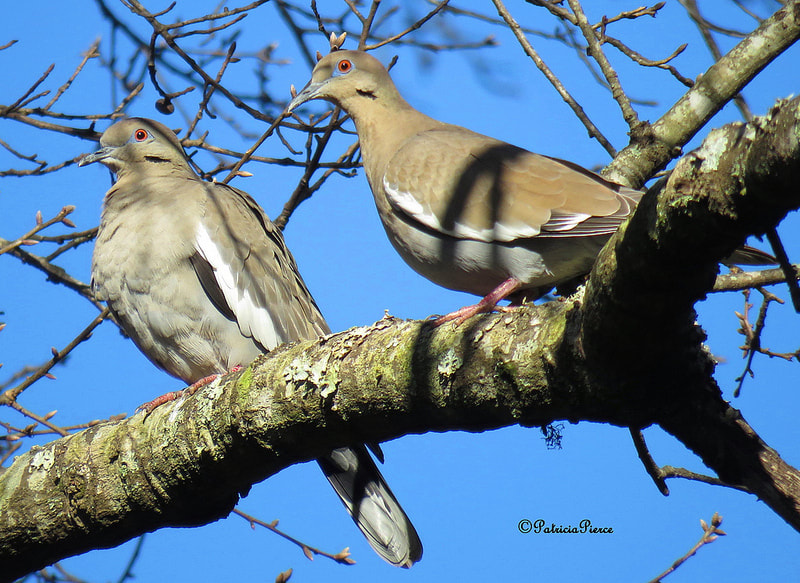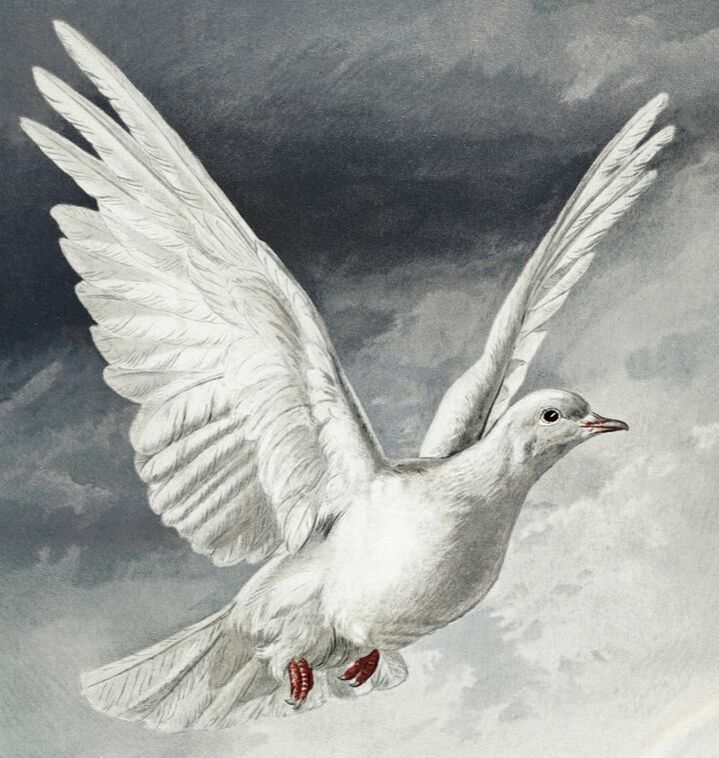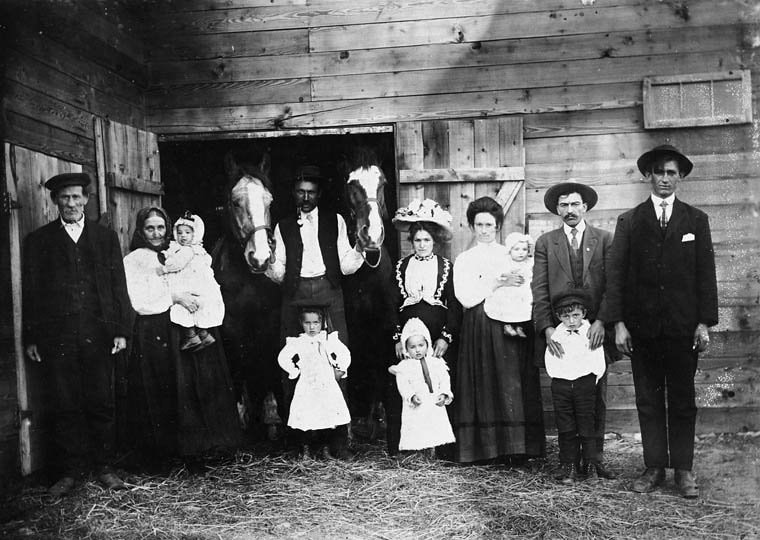|
I heard it right before Valentine's Day. Usually it begins at the end of March, but this year the cry of the dove started early. For years the mourning dove has been a consistent presence at our home in the spring. I so enjoy hearing the melancholy call of this bird! It is most frequently heard first thing in the morning (before the dove begins its daily activities) and last thing at night (before it settles down to rest).
The male dove uses his voice to attract the female and starts with one soft coo-oo, followed by two or three louder coos. He will also use his voice if there is a threat or to announce his territory. The females sometimes coo while sitting on their nests. A unique characteristic of these birds is that they can produce their own "milk." They feed their young regurgitated, partially digested food known as pigeon milk. The birds are self-sacrificing for the sake of their offspring. They stop foraging for food just before their babies are born, temporarily starving themselves so that they produce a purer "milk." This is produced for the first four or five days of their babies' lives. The female lays two eggs, 12 hours apart. Those who observe the doves as they incubate their eggs say that the male and female take turns sitting on the nest, each taking a 12-hour shift. About two weeks after the babies are born their wings are developed, and the parents begin teaching them to fly. After their first solo glide to the ground, the babies and parents remain on the ground, hiding in the bushes until the young ones can master flying and fend for themselves. During this time, it is the father who feeds them and trains the babies to be strong and independent. It is interesting to note that doves mate for life. Consider all this information about the doves. It is significant, in my opinion, that the dove is a symbol for the Holy Spirit. The New Testament books of Matthew, Mark and Luke talk about the Spirit of God descending on Jesus like a dove just after He came up out of the waters of Baptism. It is the Holy Spirit that leads us to freedom in Christ. (2 Corinthians 3:16-17) Once we have received salvation, we are filled with the Holy Spirit who becomes our guide, counselor, encourager and intercessor. He wakens us in the morning and quickens our spirits in the evening to commune with Him. Just as the male dove uses his coos to attract his mate, the Spirit of God calls to His Bride (The Church) to come to Him. The Spirit is available to us to bring us into intimacy with the Lord. The Triune God willingly sacrificed His life on the Cross so that we could have eternal life with Him. It is a forever commitment just as the doves commit to one another for life. Father, Son and Holy Spirit work together to protect and nurture us and teach us how to soar and live a victorious life. They feed us life-giving food from the Living Word that will sustain us in any situation. In Song of Solomon 2:13-14 the Bridegroom calls His Bride a dove. "...Arise, come my darling; my beautiful one, come with me. My dove in the cleft of the rock, in the hiding places on the mountainside, show me your face, let me hear your voice; for your voice is sweet, and your face is lovely." So often, what happens in the natural is mirrored in the spiritual. Could it be that the Holy Spirit is calling to us early so that we can prepare for the Presence of God? As I write this letter, I hear the cry of the dove outside of my window. May our ears be open to the cry of the Spirit as He call us into intimacy with our Lord.  How does one express love? Isn't it interesting that we have set aside a yearly holiday that is meant to encourage us to do just that? Valentine's Day is the day for us to demonstrate our love to those who are special in our lives. We do have an example of someone who walked in perfect love. The love of God was shown through His Son, Jesus Christ, who became the expression of that love through a sacrificial life that ultimately led to His death on the Cross. God loves us so much that He could not imagine eternity without us. He willingly sent His Son to earth as a Redeemer. He took on His broken body "our infirmities and carried our sorrows...He was pierced for our transgressions; He was crushed for our iniquities; the punishment that brought us peace was upon Him..." (Isaiah 53:4-5)
The love of God is found in selflessness. In 1 Corinthians 13, called the Love Chapter, we find the description of what love looks like. It is interesting to me that the fruits of the Spirit, listed in Galatians 5:22-23 have corresponding definitions in verses 4 through 7: Love: v. 5 - "It is not self-seeking...It keeps no record of wrongs." Joy: v. 6 - "Love does not delight in evil but rejoices in the truth." Peace: v. 5 - "It is not easily angered." Patience/Long Suffering: v. 4 - "Love is patient." v.7 - "It always perseveres." Kindness: v. 4 - "Love is kind. It does not envy." Goodness: v. 7 - "It always protects." Faithfulness: v. 7 - "It always trusts, always hopes." Gentleness/Meekness: v. 4 - "It does not boast; it is not proud." Self-Control: v. 5 - "It is not rude." Our walk while we are on earth should be maturing us, making us more Christ-like. We can evaluate our maturity by looking at the fruits of the Spirit. Our goal should be to produce the fruit that Jesus had. It is a lofty goal, but one that is attainable if we keep our eyes on Jesus. Our obedience to God's commands helps us to grow and develop in the fruits of the Spirit. All the fruits stem from the first one--LOVE. Song of Solomon was written as a book to help us reflect on the intimacies of God's love. It compares the bride to a "garden locked up" and lists the plants in that garden. There are nine plants in the garden, just as there are nine fruits of the Spirit. (Song of Solomon 4:12-14) The disciple John unequivocally declares in 1 John 4:8, "God is love!" Jesus came to earth so that we could see what God looks like. The Church, as the Bride of Christ, must learn to walk in love. By doing so we will develop all the fruits of the Spirit. “And just as we have borne the likeness of the earthly man, so shall we bear the likeness of the man from heaven." (1 Corinthians 15:49) God created man in His image. He made him with a soul and spirit so that we could function in two realms: natural and spiritual. We see in Genesis 2:7 that God formed man from dust and then breathed into him. Thus, we have dust as the soul life and the breath of God as the spirit life. Adam's sin of eating from the tree of knowledge of good and evil brought death to his spirit. (Genesis 2:17) With a dead spirit, we are unable to function the way God intended. That is why Jesus, the Word incarnate, came to earth. He came to redeem and restore what Adam lost. When we repented of our sins and asked Jesus to be our personal Savior and Lord, we became a "new creation" and the Spirit of God took up residence in our spirits.
Look at John 3 and read about what Jesus told Nicodemus, a Pharisee searching for truth. Jesus said, "I tell you the truth, no one can enter the Kingdom of God unless He is born of water and the Spirit." (Verse 5) Jesus was saying we should develop the nature of Christ through both our natural and spiritual senses. And, according to Romans 8:29, we are "predestined to be conformed to the likeness (image) of His Son..." Not only are we predestined to be like Jesus, but the body of Christ is to be built up "until we reach unity in the faith and in the knowledge of the Son of God and become mature, attaining to the whole measure of the fullness of Christ." (Ephesians 4:13) How do we reach the fullness of Christ? It seems we are more comfortable in the soul life than in the spirit life. That spirit life must be nurtured for us to grow and attain the whole measure of the fullness of Christ. The nurturing occurs as we abide in the presence of the Lord and submit our wills to His will. God has given us His Holy Spirit to guide us, so it is important that we practice listening to His voice. Our spiritual capacity grows as we make a commitment to trust the Lord and His working in our lives and are obedient to follow His instructions. We must make a commitment to put the Lord first and seek Him in our daily lives. Brother Lawrence knew how to do this. He became an expert at connecting with the Holy Spirit amid his daily activities. He called it practicing the presence of the Lord. He wrote, "In all things, we should act toward God with the greatest simplicity, speaking to Him frankly and plainly and imploring His assistance in our affairs just as they happen." Brother Lawrence continues: "I am aware of my obligations to love God in all things." Our challenge is to live with Christ as the center of our lives. Let us pray the prayer of Paul in Ephesians 3:16-17. "I pray that out of His glorious riches He may strengthen you with power through His Spirit in your inner being, so that Christ may dwell in your hearts through faith." The lives of the generations who came before us have an impact on us today. Likewise, our lives will have an impact on the generations to come. Our ancestries usually come from a variety of countries and traditions. My mom's family is of German, Irish and English descent. My dad comes from Swedish and German stock. My ancestors' personalities and practices, abilities and talents have a direct effect on who I am now. Their attributes have been passed on to me.
Since I am a Christian, my ancestral influence also comes from the family I am grafted into—Abraham's family. One of my favorite Scriptures concerning our heritage as Christians comes from Romans 4. Verse 13 explains the promise God gave to Abraham. "It is not through law that Abraham and his offspring received the promise that he would be heir of the world, but through the righteousness that comes by faith." Verse 16 and 17 explain further. "The promise comes by faith, so that it may be by grace and may be guaranteed to all Abraham's offspring--not only to those who are of the law but also to those who are of the faith of Abraham. He is the father of us all. As it is written: 'I have made you a father of many nations.' He is our father in the sight of God, in whom he believed—the God who gives life to the dead and calls things that are not as though they were." Let's look at Galatians 3:29. "If you belong to Christ, then you are Abraham's seed, and heirs according to the promise." We are heirs to the promises of God and our heritage is one of righteousness and faith. "Consider Abraham: 'He believed God, and it was credited to him as righteousness.' Understand, then, that those who believe are children of Abraham. The Scripture foresaw that God would justify the Gentiles by faith, and announced the gospel in advance to Abraham: 'All nations will be blessed through you.' So those who have faith are blessed along with Abraham, the man of faith.'" (Galatians 3:6-9) God told Abraham, "Leave your country, your people and your father's household and go to the land I will show you. I will make you into a great nation and I will bless you..." (Genesis 12:1-2) The definition of Abraham's name is "father of many nations" or "father of multitudes." He is called a Hebrew for the first time in Genesis 14:13. Hebrew means "one who crosses over from the other side." This is exactly what Abraham did as he left all that he was familiar with and traveled to a land he did not know. In this act, he demonstrated the faith he had in God's promises. All the characteristics that Abraham and his descendants demonstrated were handed down to Believers. Other attributes for Believers are written about in the Psalms and in Isaiah. "For you have heard my vows, O God; you have given me the heritage of those who fear Your name." (Psalm 61:5) "Your statutes are my heritage forever; they are the joy of my heart." (Psalm 119:111) “No weapon forged against you will prevail, and you will refute every tongue that accuses you. This is the heritage of the servants of the Lord, and this is their vindication from me..." (Isaiah 54:17) God has planted both unique and similar qualities within each of us so that we can live out our destinies. All that has been given to us through Abraham's line is what makes us carriers of the Lord's presence. We have a rich inheritance from Him. Within us are seeds of righteousness, faith, fear of the Lord, respect for God's Word and power to overcome every obstacle. Let us use these qualities to the glory of the Lord! |
Joan E. MathiasCategories
All
Archives
July 2024
|



 RSS Feed
RSS Feed